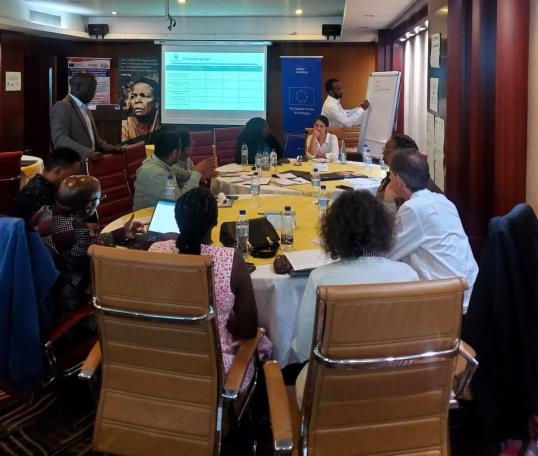
The support to economic and employment opportunities constitutes around 25% of EUTF funding in the Horn of Africa region (EUR 421 M). More than 100 EUTF projects have implemented activities to improve economic and social inclusion and create business opportunities, supporting business environment or trainings and mentoring to bridge the skills gaps for the youth and most vulnerable groups.
In March 2024, the EU Emergency Trust Fund (EUTF) Team, together with the Center for Evaluation & Development (C4ED), co-organized a seminar in Addis Ababa to look jointly with our partners at the impacts of these projects. This event took place in the frame of an evaluation initiative covering the full economic development project portfolio of the EUTF, and under the leadership of the EUTF Sahel Lake Chad window.
Assessing Economic Impact and Employment Outcomes in Ethiopia and Uganda
With over 50 attendees, a mix of onsite and virtual participants, the seminar brought together programme managers from partner organisations, sector specialists from DG INTPA, M&E specialists, researchers as well as Ethiopian and Ugandan government representatives. The main objective of the event was to focus on impacts on economic opportunities and employment of selected EUTF projects in Ethiopia and Uganda.
In that frame, the seminar highlighted the initial findings of impact evaluations conducted for two projects : Socio-Economic Development and Better Employment Opportunities (STEDE) in Ethiopia and led by Mercy Corps, for which the evaluation team analysed the impact of Village Savings and Loans Associations (VSLA) and Response to increased demand on Government Service and creation of economic opportunities in Uganda (RISE) carried out by GIZ for which the technical training component was the evaluation’s focus. Findings from the overall portfolio analysis were also shared to reflect trends and contrasts between projects and regions.
Preliminary Insights: Key Impacts and Learning
Evaluators shared insights on the outcomes of EUTF's interventions in the Horn of Africa and beyond, highlighting key areas of impact and learning:
- Projects targeted populations directly affected by the refugee crisis show an important level of adaptability to the unique needs of these groups.
- Preliminary results evidence an increase perceived employability of beneficiaries as a result of their confidence in the skills attained. Beneficiaries perceived their improved skills as relevant for the local job market and were confident that they could find wage jobs or start a business in the future.
- Projects aiming to promote employment show preliminary positive impacts but mainly thanks to the participation in income generating activities and not wage employment.
- Results regarding social integration were mixed, as many projects could not address structural elements as the legal barriers faced by refugees. Some activities also generated negative impacts on trust that will be further explored in 2024.
- Evaluators found very heterogenous results between males and females, and between members of the host communities and refugee populations.
- Importance of start-up capital following the completion of trainings to support the transition to a professional activity.
- Critical importance of tackling barriers rooted in social norms that limits women participation in the trainings and in the job market.
Over the course of the seminar, group sessions took place to discuss these findings and share ways of incorporating these lessons into on-going and future projects.
A New Way of Doing Evaluation
As part of its commitment to produce knowledge for evidence-informed decisions, the EUTF decided to add to its evaluation toolkit counterfactual impact evaluations. These evaluations use “comparison groups” to identify impact by contrasting beneficiaries with non-beneficiaries, determining what is the impact (or causal effect) of a program. This type of evaluations had not been used at this scale before by DG INTPA due to the complexity of putting them in place in fragile contexts.
The seminar looked at the experience and lessons learned implementing these counterfactual impact evaluations, and participants discussed the importance of clear communication and agreements between evaluators and project implementers on the selection process, on ensuring adequate sample sizes, and on providing robust support for selected participants to avoid drop-outs.
Further information:
To consult the Portfolio and Project evaluation factsheets in different languages click here.
The Response to increased demand on Government Service and creation of economic opportunities in Uganda (RISE) project seeks to strengthen local authorities and improve economic opportunities of young people in host and refugee communities in the northern districts of Uganda.
A counterfactual impact evaluation (CIE) is being conducted to determine program impact.
- Region and Country
- Horn of Africa
- Uganda
- Thematic
- Greater economic and employment opportunities
- Type of document
- Factsheet
Factsheet: Counterfactual Impact Evaluation of the STEDE Project in Ethiopia
The STEDE project aims to improve the livelihoods of refugees and host communities in the Fafan zone, in the Somali Regional State of Ethiopia, by promoting economic and social inclusion.
To understand the impacts of Village Savings and Loan Associations (VSLAs), C4ED is conducting a counterfactual impact evaluation (CIE).
- Region and Country
- Horn of Africa
- Ethiopia
- Thematic
- Greater economic and employment opportunities
- Type of document
- Factsheet
Minifilms have been recently released which you can access here: Overview of the European Union's Trust Fund for Africa and its evaluation (youtube.com)
Minifilm 1 presents EUTF’s actions on the African continent and the methodological approach for Counterfactual Impact Evaluations as a response to the migration crisis.
- Minifilm 1 EN: https://youtu.be/O3RAdorTsVI
- Minifilm 1 FR: https://youtu.be/4XgqLeR3MCc
The second Minifilm presents an overview of the EUTF and its evaluation.
- Minifilm 2 EN: https://youtu.be/Wqfd6QjzOM4
- Minifilm 2 FR: https://youtu.be/eJY8FMpX1_M
Details
- Publication date
- 31 May 2024
- Author
- Directorate-General for International Partnerships
- Region and Country
- Horn of Africa
- Thematic
- Greater economic and employment opportunities


